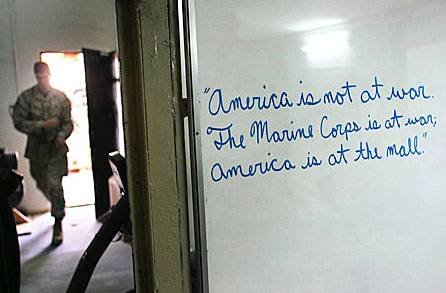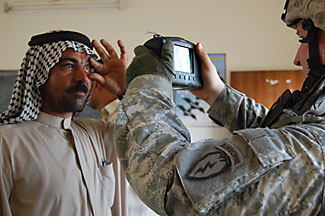Bill Lind’s Iranian Nightmare
BY Herschel SmithBad dreams are scary things. The sweats, the shakes, the bad memories, or whatever. I don’t know. I have never actually had a nightmare before so I wouldn’t know (except maybe the one about failing to turn in my last senior exam and failing to graduate college, thus having to start over again – it was indeed a bad, bad night for The Captain’s Journal, very little sleep). But Bill Lind gives us one to consider. It begins in Iran, with the pitiful U.S. Army and Marines running for cover and trying to escape the horrible wrath of mechanized divisions of the powerful Iranian guard.
Now, to be clear, we have not advocated all out ground war with Iran, but rather, selected air strikes against insurgent training grounds, enhanced border security, more aggressive tactics against Badr (SIIC) and Sadr (actually, we have advocated the assassination of Sadr) and his so-called Mahdi Army, and the fomenting of a full blown insurgency in Iran. But Bill Lind sees a nightmare if we launch air strikes into Iran. Courtesy of a Small Wars Journal discussion thread, here is is. Gird your loins or run for mommy, for it is a bad situation indeed.
The purpose of this column is not to warn of an imminent assault on Iran, though personally I think it is coming, and soon. Rather, it is to warn of a possible consequence of such an attack. Let me state it here, again, as plainly as I can: an American attack on Iran could cost us the whole army we now have in Iraq.
Here’s roughly how it might play out. In response to American air and missile strikes on military targets inside Iran, Iran moves to cut the supply lines coming up from the south through the Persian Gulf (can anyone in the Pentagon guess why it’s called that?) and Kuwait on which most U.S. Army units in Iraq depend (the Marines get most of their stuff through Jordan). It does so by hitting shipping in the Gulf, mining key choke points, and destroying the port facilities we depend on, mostly through sabotage. It also hits oil production and export facilities in the Gulf region, as a decoy: we focus most of our response on protecting the oil, not guarding our army’s supply lines.
Simultaneously, Iran activates the Shiite militias to cut the roads that lead from Kuwait to Baghdad. Both the Mahdi Army and the Badr Brigades — the latter now supposedly our allies — enter the war against us with their full strength. Ayatollah Sistani, an Iranian, calls on all Iraqi Shiites to fight the Americans wherever they find them. Instead of fighting the 20% of Iraqis population that is Sunni, we find ourselves battling the 60% that is Shiite. Worse, the Shiites logistics lie directly across those logistics lines coming up from Kuwait.
U.S. Army forces in Iraq begin to run out of supplies, especially POL [petroleum, oil, and lubricants], of which they consume a vast amount. Once they are largely immobilized by lack of fuel, and the region gets some bad weather that keeps our aircraft grounded or at least blind, Iran sends two to four regular army armor and mech divisions across the border. Their objective is to pocket American forces in and around Baghdad.
The U.S. military in Iraq is all spread out in penny packets fighting insurgents. We have no field army there anymore. We cannot reconcentrate because we’re out of gas and Shiite guerrillas control the roads. What units don’t get overrun by Iranian armor or Shiite militia end up in the Baghdad Kessel. General Petraeus calls President Bush and repeats the famous words of Marshal MacMahon at Sedan: “Nous sorrune dans une pot de chambre, and nous y serron emerdee.” Bush thinks he’s overheard Petraeus ordering dinner — as, for Bush, he has.
U.S. Marines in Iraq, who are mostly in Anbar province, are the only force we have left. Their lines of supply and retreat through Jordan are intact. The local Sunnis want to join them in fighting the hated Persians. What do they do at that point? Good question.
As I have warned before, every American ground unit in Iraq needs its own plan to get itself out of the country using only its own resources and whatever it can scrounge locally. Retreat to the north, through Kurdistan into Turkey, will be the only alternative open to most U.S. Army units, other than ending up in an Iranian POW camp.
Even if the probability of the above scenario is low, we still need to take it with the utmost seriousness because the consequences would be so vast. If the United States lost the army it has in Iraq, we would never recover from the defeat. It would be another Adrianople, another Manzikert, another Rocroi. Given the many other ways we now resemble Imperial Spain, the last analogy may be the most telling.
Waking from the cold sweats, we can now evaluate this nightmare. We re-wrote part of this scenario over the discussion thread something like the following:
“Iran sends two to four mech divisions across the border, and to their surprise are awaited by so many U.S. aircraft monitoring, bombing and firing cannon at their slow, lumbering vehicles that the roads become another “highway of death,” with Iranian dead and vehicles littering roads for miles, great columns of smoke filling the skies, Iranian students protesting in the capital city, and the government in virtual collapse …”
The air power (AF, Navy, and Marines) desperately wants to be unleashed. They ache for it. They pant for it. So, give them the Iranian and Syrian borders. Tell them that unmitigated war makes trade and population migration unreasonable, and so anything that comes across the border is fair game to be utterly destroyed. The AF will unleash their fighters, and their A-10Cs with its faster kill chain (please send us the video). The Navy air craft carriers will be busy. U.S. air power will have a good day, which is about how long it will take to destroy four mechanized divisions and send them to eternity. Literally, all hell would be unleashed upon Iranian forces were they to be sent across the border.
Next, to suppose that the Army could not regroup from counterinsurgency into a conventional fighting force quickly enough is preposterous. From combat outposts they would come from all around, excited with anticipation, and the only question is who could get to the forces of Badr and Sadr the fastest – the Army or Marines in Anbar. The Marines would make a good show of it, making proud to saddle on backpacks, body armor, hydration system, ammunition, weapon and MREs from all over Anbar and using HMMWVs and foot power to get to the fight before the Army did. Patton, the architect of the relief of Bastone, would be proud.
The Marines are bored, bored, bored in Anbar. Any chance to get back into the fray would be met with approval from the rank and file. Lind’s nightmare is scary indeed, but hopefully he is awake now and things look better than they did before. The notion of Marines running for the Jordanian border seems far removed from reality now. It’s better to be awake and in reality than not. The Marines don’t run, Bill.













